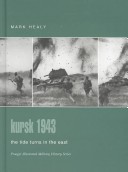Armour in Theatre S.
1 total work
v. 1
In the summer of 1943 the German army stood poised for a major offensive. The attack was aimed at the Kursk salient, which the Germans intended to isolate, trapping large numbers of Russian troops and paving the way for the decisive campaign to knock the Soviet Union out of the war. Warned of the imminent attack by good intelligence, the Russians had turned the salient into a mass of strong defensive positions. In the decisive clash that followed, the Soviets bled German forces white. The counter-offensive which followed began an advance that would end in the ruins of Berlin.
In the summer of 1943 the German army stood poised for a major offensive. The attack was aimed at the Kursk salient, which the Germans intended to isolate, trapping large numbers of Russian troops and paving the way for the decisive campaign to knock the Soviet Union out of the war. Warned of the imminent attack by good intelligence, the Russians had turned the salient into a mass of strong defensive positions. In the decisive clash that followed, the Soviets bled German forces white. The counter-offensive that followed began an advance that would end in the ruins of Berlin.
After the successful battles around Kharkov in early 1943, the German army stood poised for a major offensive in the summer of 1943. This attack was aimed at the Kursk salient, a large bulge in the front that the Germans intended to pinch off, thus trapping large numbers of Russian troops and breaking the front open for the decisive campaign to knock the Soviet Union out of the war. Soviet intelligence was well aware of German intentions however, and the Red Army had turned the salient into a mass of defensive positions. In the decisive clash of steel that followed, the Soviets bled Germany's vital Panzer forces white and finally took the initiative. The counter-offensive that followed began an advance that would finally end in the ruins of Berlin. This then, was the deciding confrontation of World War II. Mark Healy details the individual actions that took place and explains why Stalin and Zhukov were prepared to lose 50% of the Soviet tank force in this encounter. He also examines the reasons for the German defeat in spite of the fact that they had a technological edge over their opponents for the first time since the beginning of Operation Barbarossa. Furthermore, not only are the armored forces of each side investigated, but air power and the role that this played in the battle is also looked at in this wonderfully detailed title.
